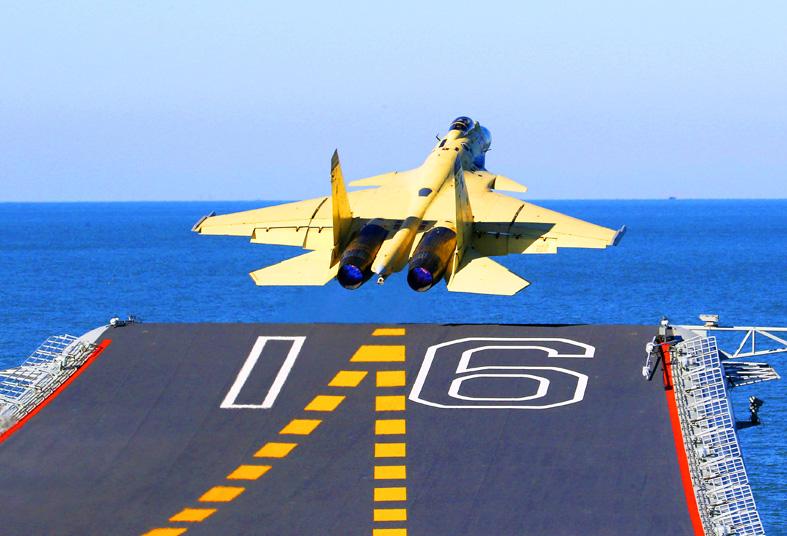From tomorrow, China legally requires foreign vessels entering what it considers to be its territorial waters to notify Beijing, creating what some fear is a “ticking time bomb” for conflict in the South China Sea.
The Standing Committee of the National People’s Congress in April amended China’s Maritime Traffic Safety Law (海上交通安全法) to require all foreign vessels entering Chinese territorial waters to inform maritime authorities, carry relevant permits, and submit to Chinese command and supervision.
It also gives Beijing the authority to instruct foreign vessels that “threaten the safety of Chinese internal or territorial waters” to leave and to exercise the “right of immediate pursuit.”

Photo: AP
According to the UN Convention on the Law of the Sea, territorial waters are defined as the 12 nautical miles (22.2km) of sea extending from terrestrial territory, with the “right of innocent passage” reserved for vessels moving through territorial waters in a manner that does not threaten the security of the coastal state.
The Chinese Maritime Safety Administration said in a statement that the new reporting requirement would apply to all submersibles, nuclear vessels and ships carrying radioactive or harmful substances, as well as any foreign vessels deemed to “endanger the maritime traffic safety of China.”
Reports should include the vessel’s name, call sign, current position, next port of call, estimated course and speed, nature of goods and loading capacity, it said.
Other nations are afraid that China’s exploitation of the law to expand the scope of “gray zone” conflict could become a ticking time bomb, said Su Tzu-yun (蘇紫雲), director of the Division of Defense Strategy and Resources at the Institute of National Defense and Strategic Research.
Beijing considers its maritime jurisdiction to encompass more than just its coastal waters, Su said.
This would include the 12 nautical miles of sea surrounding the artificial reefs it has constructed in the South China Sea, giving Beijing an excuse to respond to freedom of navigation exercises carried out by other nations, he said.
Taiwan Democracy Watch specialist Sung Cheng-en (宋承恩) said that he expects the impact on the Taiwan Strait to be slight.
Under the UN convention, waters between Taiwan and China are considered an international strait through which freedom of navigation “solely for the purpose of continuous and expeditious transit of the strait” is guaranteed.
However, Sung agreed that the amendment could affect US operations in the South China Sea, depending on how China’s coast guard chooses to enforce the law.

MAKING WAVES: China’s maritime militia could become a nontraditional threat in war, clogging up shipping lanes to prevent US or Japanese intervention, a report said About 1,900 Chinese ships flying flags of convenience and fishing vessels that participated in China’s military exercises around Taiwan last month and in January last year have been listed for monitoring, Coast Guard Administration (CGA) Deputy Director-General Hsieh Ching-chin (謝慶欽) said yesterday. Following amendments to the Commercial Port Act (商港法) and the Law of Ships (船舶法) last month, the CGA can designate possible berthing areas or deny ports of call for vessels suspected of loitering around areas where undersea cables can be accessed, Oceans Affairs Council Minister Kuan Bi-ling (管碧玲) said. The list of suspected ships, originally 300, had risen to about

DAREDEVIL: Honnold said it had always been a dream of his to climb Taipei 101, while a Netflix producer said the skyscraper was ‘a real icon of this country’ US climber Alex Honnold yesterday took on Taiwan’s tallest building, becoming the first person to scale Taipei 101 without a rope, harness or safety net. Hundreds of spectators gathered at the base of the 101-story skyscraper to watch Honnold, 40, embark on his daredevil feat, which was also broadcast live on Netflix. Dressed in a red T-shirt and yellow custom-made climbing shoes, Honnold swiftly moved up the southeast face of the glass and steel building. At one point, he stepped onto a platform midway up to wave down at fans and onlookers who were taking photos. People watching from inside

Japan’s strategic alliance with the US would collapse if Tokyo were to turn away from a conflict in Taiwan, Japanese Prime Minister Sanae Takaichi said yesterday, but distanced herself from previous comments that suggested a possible military response in such an event. Takaichi expressed her latest views on a nationally broadcast TV program late on Monday, where an opposition party leader criticized her for igniting tensions with China with the earlier remarks. Ties between Japan and China have sunk to the worst level in years after Takaichi said in November that a hypothetical Chinese attack on Taiwan could bring about a Japanese

The WHO ignored early COVID-19 warnings from Taiwan, US Deputy Secretary of Health and Human Services Jim O’Neill said on Friday, as part of justification for Washington withdrawing from the global health body. US Secretary of State Marco Rubio on Thursday said that the US was pulling out of the UN agency, as it failed to fulfill its responsibilities during the COVID-19 pandemic. The WHO “ignored early COVID warnings from Taiwan in 2019 by pretending Taiwan did not exist, O’Neill wrote on X on Friday, Taiwan time. “It ignored rigorous science and promoted lockdowns.” The US will “continue international coordination on infectious